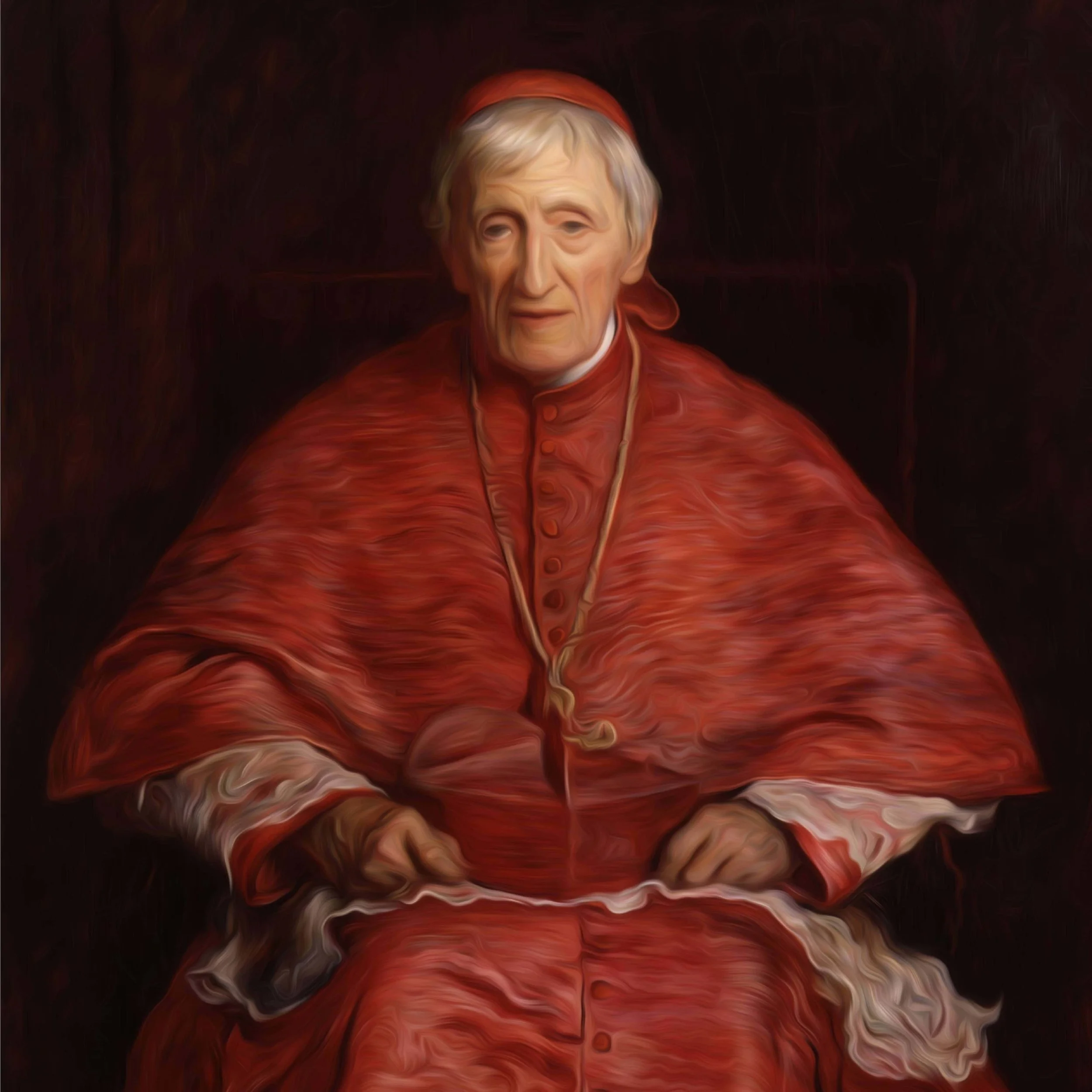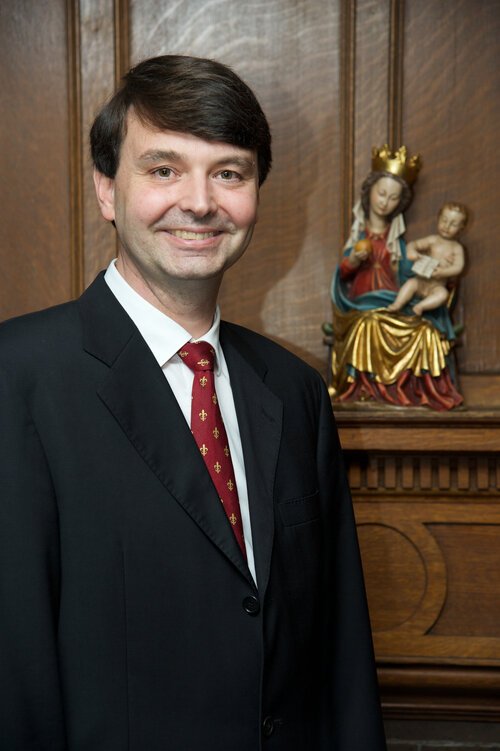St. John Henry Newman: Stalwart Defender of Conscience
To view a PDF of this document, click here.
Sir John Everett Millais, Portrait of John Henry Newman, 1881
St. John Henry Newman will soon be proclaimed a Doctor of the Church by Pope Leo XIV. This prominent 19th century English convert to Catholicism made significant contributions to the understanding of conscience within Catholic moral theology and ultimately to modern bioethics. A significant concern of the Church is an ethical approach to medicine that respects the consciences of both patients and health care professionals when moral problems arise. Informed consent, based on discernment in conscience, is a fundamental requirement for the ethical practice of medicine and scientific research involving human subjects.
Newman's theological insights offer us a valuable contribution to bioethics, a field characterized by morally complex issues at the intersection of life, biomedicine, and technology. His emphasis on conscience can empower individuals to take personal responsibility for their moral choices. In bioethics, this means patients or their medical decision-making proxies should actively seek to understand treatment options and weigh potential risks and benefits carefully in light of an informed conscience. Health care professionals, guided by a well-formed grasp of what is right and good, should offer care that respects both the patient's autonomy and right of conscience.
Newman viewed conscience as far more than subjective personal feelings or instincts; rather, he considered it the very voice of God within the human heart, guiding individuals toward moral truth. According to Newman, this understanding elevates conscience to a divine gift that necessitates obedience and becomes the "aboriginal Vicar of Christ," as he famously described it. This emphasizes its critical role as a guide to moral truth, stressing both its authority and its crucial link to the divine.
Catholic teaching on the binding nature of one’s conscience is astonishingly bold as stated in the Catechism of the Catholic Church, paragraph 1790.
A human being must always obey the certain judgment of his conscience. If he were deliberately to act against it, he would condemn himself. Yet it can happen that moral conscience remains in ignorance and makes erroneous judgments about acts to be performed or already committed.
This amounts to a religious duty to obey one’s conscience. Given the gravity of this requirement, and the fact that we are fallible beings, an equally serious responsibility exists for everyone to form his or her conscience extremely well.
Newman stressed the importance of the formation of conscience by seeking God's will as manifested in the Bible, Church teachings, and personal reflection with the help of wise counselors. He recognized that conscience is not a static entity but a dynamic and evolving judgment of reason that can grow in perfection through an individual's spiritual journey, a lifelong endeavor. Parents have a special responsibility towards their children in assisting them to develop and form their consciences. Teachers and spiritual guides have key roles to play as well. This development of a robust conscience is aided by personal experiences, contemplation, and a deepening relationship with God.
In recent decades a major bioethical concern has been the coercion of health care professionals to participate in abortion, euthanasia, or other procedures that violate their conscientious principles but have been given the sanction of law in some countries. My doctoral dissertation cited Newman’s insights as I explored the modern crisis of the coercion of physicians, nurses, pharmacists, etc. in many contemporary contexts. It is a blessing that American jurisprudence has frequently upheld the protection of religious liberty and conscience rights.
The right to act in accord with one’s conscience is not a proverbial “get out of jail free card.” Good justifying reasons should be provided for one’s convictions and can be required by employers and civil authorities. Perhaps the most compelling proof that following one’s conscience is the highest concern of virtuous people is the willingness of so many over the centuries to accept even execution rather than give in to demands to seriously violate their consciences. Those who have a sincere belief in their convictions will be ready to make sacrifices that testify to the truthfulness of their claims. At the same time, it is morally wrong to punish people in an attempt to coerce them to conform to orders that violate conscience.
Newman was also clear about the potential for conscience to be warped or erroneous. This is particularly relevant in bioethics, where the sanctity of life and human dignity are often challenged by societal pressures or technological advances. He recognized that if conscience is not properly aligned with divine and moral law, it can be distorted by personal biases, external influences, or even a misguided sense of autonomy. This underscores the critical need for robust ethical safeguards in bioethics to prevent decisions based on a corrupted conscience leading to actions that violate natural law.
Newman's deep understanding of the relationship between conscience and the pursuit of the truth was a very striking feature of his thought. The dynamic interplay between individual discernment and adherence to objective moral truths rooted in the Church's teachings provides the framework for navigating ethical dilemmas. In bioethics, this translates to engaging with the Church's moral guidance and ethical directives while applying these principles thoughtfully and diligently in concrete situations and circumstances.
John Henry Newman's teachings on conscience remain profoundly relevant in today's rapidly evolving bioethical landscape. By emphasizing conscience as the voice of God within the human heart, its dynamic and evolving nature, and the importance of its proper formation through a deep relationship with God and the Church's teachings, Newman offers a powerful framework for navigating the complexities of bioethics with integrity and moral clarity. As a newly proclaimed Doctor of the Church, his insights should be even more influential in the future. They empower individuals to make morally sound decisions, ensuring their actions are rooted in personal conviction and aligned with God’s will, while safeguarding human life and dignity in a world facing new and evolving ethical dilemmas created by technological advances.
Joseph Meaney received his PhD in bioethics from the Catholic University of the Sacred Heart in Rome. His doctoral program was founded by the late Elio Cardinal Sgreccia and linked to the medical school and Gemelli teaching hospital. His dissertation topic was Conscience and Health Care: A Bioethical Analysis. Dr. Meaney earned his master’s in Latin American studies, focusing on health care in Guatemala, from the University of Texas at Austin. He graduated from the University of Dallas with a BA in history and a concentration in international studies. The Benedict XVI Catholic University in Trujillo, Peru, awarded Dr. Meaney an honorary visiting professorship. The University of Dallas bestowed on him an honorary doctorate in Humane Letters in 2022.


